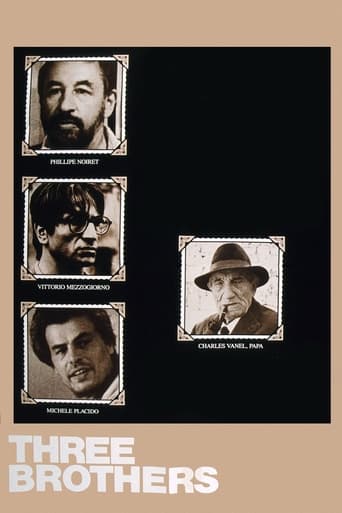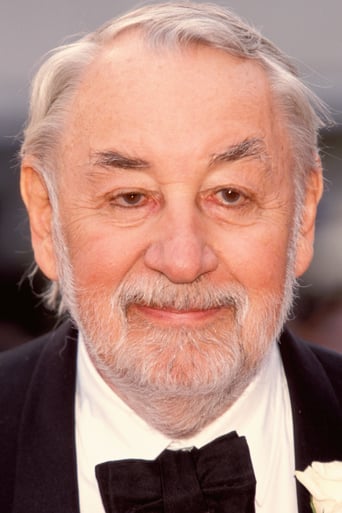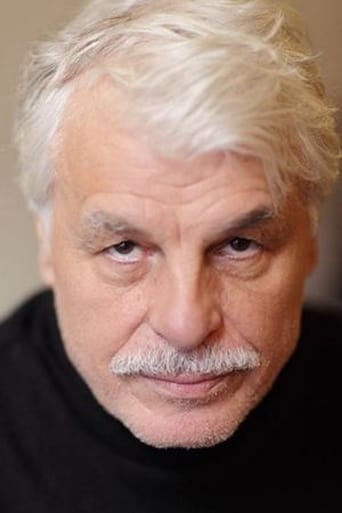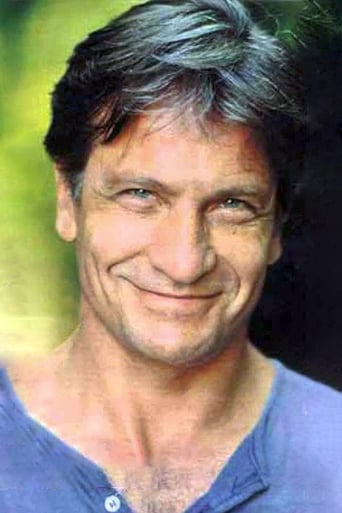

Three Brothers (1981)
In a farmhouse in southern Italy, an old woman dies. Her husband summons their sons: from Rome, Raffaele, a judge facing a political case for which he risks assassination; from Naples, the religious and ideological Rocco, a counselor at a correctional institute for boys; from Turin, Nicola, a factory worker involved in labor disputes. Once home, each encounters the past and engages in reveries of what may come.
Watch Trailer
Cast


Similar titles
Reviews
Beautifully directed and beautifully shot film from Francesco Rosi. From the wonderfully framed shot behind the opening credits at the very start I was enchanted and fascinated. A simple enough tale of an old man calling his three sons to his isolated farmhouse following the death of their mother. The three are all at work in the modern world and we gather it is rare that they meet up or visit their childhood home. Contrasts abound between the three and their father and their differing lifestyles. The judgmental judge, the utopian carer for delinquent boys and the militant factory worker (all representing facets of the director's personality, he is said to have claimed) all discuss the way they see the world and more especially their homeland, then being torn apart by assassinations, corruption and union and mafia intervention. Pastoral and yet vigorous with the undercurrents of pessimism and loss of hope and search for love are very well handled and make for absorbing viewing.
This Italian film is one I read about in the book 1001 Movies You Must See Before You Die, the title made it obvious what the main subject was, but the story I did not know, I hoped it would be good, directed by Francesco Rosi (Christ Stopped at Eboli). Basically in southern Italy, the matriarch of the Giuranna family dies in the farmhouse, her husband summons their three sons from Rome to prepare for the funeral, each of whom are facing difficult personal problems. The first son, Raffaele (Philippe Noiret), is a courtroom judge presiding over a terrorism case, at risk of assassination he is in constant fear for his life. The second son, Rocco (Vittorio Mezzogiorno), is a religious man who lives in Naples, he works as a counsellor at a correctional institute for boys, hoping to achieve his dream of helping troubled teenagers. The third son, Nicola (Michele Placido), lives in Turin and works as a factory worker, he is involves in a labour dispute and his marriage is failing. Each of the men grieve for the loss of their mother in their own way, while also grappling with the other emotional issues that are pressing on them. The three brothers encounter the past and contemplate things that may come: Raffaele imagines himself dying, Rocco dreams of helping youths of Naples out of violence, drugs and corruption, and Nicola pictures himself and his wife and embracing, meanwhile the old man and his granddaughter take care of the farm and grieve together. Also starring Charles Vanel as Donato Giuranna and Andréa Ferréol as Raffaele's Wife. I understood the main plot of the story with a family of three brothers and the father brought together for the funeral of the mother, but I agree with critics it is perhaps overloaded with other topics about age gaps, marriage trouble, terrorism, politics, and of course death, overall it certainly engages you enough however that makes an interesting enough drama. Worth watching!
The disturbing opening scene is a nightmare that Rocco Giuranna is having. The rats that are scavenging a trash site seem to herald what he and his two brothers will face as the three come together because the death of their mother. Rocco is a social worker living in a state reformatory where he is in charge of young boys that are in the institution to be re-educated. Unfortunately, they will probably will go to be hard criminals when they are released from the Naples correctional facility.Raffaele, the older brother, is a judge in Rome. He has been asked to preside over an important case coming to trial that involves local terrorists. Italy was living harsh days at the time and judges were the target for paid assassins or revolutionaries with an agenda for eliminating those that dared to speak against them. The upcoming trial has a profound effect on Raffaele's wife, who knows it probably means the death of her husband.The third brother, Nicola, is a factory worker. Like his brothers, he fled the poor South of Italy in search for a better future in Torino. What he finds is unhappiness as he rebels against the firm he feels is enslaving him and his co-workers. His marriage has suffered because his wife has cheated on him and they are separated.It is at this junction that all three brothers are summoned to come home as their mother has died. Donato, the older father, is lost, as he ponders what is going to become of him. His memories of happier times, with the woman he adored, keep flooding back to him as his three sons come home to mourn for their loss. The three brothers, in turn, are haunted by their own memories of their present lives and their youth in the small town in Puglia before they left home.Francesco Rosi, adapted Andrei Platonov's novel "The Third Son", together with Tonino Guerra, one of the best writers in the Italian cinema. Mr. Rosi, a director who shows an affinity for presenting ordinary people in difficult situations in their lives, scored a big success with this film. He knows these characters. The director makes an enormous contribution in the way he deals with the emotions of the principals in this film about the love of the land, on the one hand of Donato, the father, and the restlessness of the three sons that abandoned their birth place in search of a better living. Rosi's triumph is in showing us that ultimately, it's Donato, the father, the one that stayed behind who is the one that lived a better life than their three sons.The director achieves a triumph in the way he directed the four principals in the film. Philippe Noiret, Michele Placido, and Vittorio Mezzogiorno do an excellent job in bringing to life, Raffaele, Nicola and Rocco. It is however Charles Vanel, the veteran French actor who stays with the viewer because of his exquisite portrayal of the older Donato. Mr. Vanel hardly utters a word throughout the movie, yet, his presence is so powerful that at times one tends to forget the others. Mr. Vanel's Donato is one of the best creations in his long film career in France.Pasqualino DiSantis' cinematography captures the essence of what Francesco Rosi was looking for. The director and his photographer were well attuned indeed. Ruggero Mastroianni's film editing shows once more his elegant style of putting the material together. Francesco Rosi is the one that brought all the elements together in this dramatic and satisfactory film.
An old man goes to the telegraph office and transmits the news of the decease of their mother to his three sons, who live scattered all over Italy. So much for the initial situation, which Rosi has taken from a Platonov story.The sons, who then arrive one by one in the South Italian village of the father, are far apart from each other, not only concerning their age. They have also taken completely different roads in their professional careers and in their spiritual developments. The first one, a judge, has to deal with terrorist cases and every day has to reckon with being killed cold-bloodedly by the mafia. The second one could almost be one of the terrorists himself, at least he strives for societal changes, being a worker and a trade union member. The third one has dedicated his life completely to the fulfilment of utopian educational targets and looks after maladjusted juvenile delinquents in a boarding school.The Italy presented by Rosi is as disunited as the chosen family. It is not only geographically split into two incompatible halves, the North and the South, but also sociologically into different classes that stand facing each other irreconcilably. But "Tre fratelli" has more to offer than just regional or social conflicts. Life itself becomes the center of attention, apart from the three brothers, who represent middle age, also the old father and his eight-year-old grand-daughter are dominating protagonists. These two are able to form a curious alliance of old age and youth, whereas the brothers are just talking at cross purposes in senseless discussions and only reach a sentiment of unison through the mourning at their mother's funeral.The little girl wants to know a lot about the past, and the old man is willing to remember. He finally recalls the perhaps most blissful moment of his life: Shortly after his wedding he accompanies his wife to the beach, where they both enjoy a short spell of light-heartedness, just before the hard struggle of earning one's living will demand all their forces. There the woman is playing in the sand, lost in thought, but then she suddenly rouses from her daydream and calls out the name of her husband: She can't find her wedding ring, which she has removed accidentally, and now it seems to be lost in the sand. Everything is at stake, but tragedy can be averted for the man keeps his cool, rushes to the next house and comes back with a sieve. A little later he holds the recovered ring in his hands triumphantly.This event seems to have been meaningful for the further living together of the couple, only the late arrival of Death intervenes in this apparently undisturbed harmony. The feelings of the old man are now marked by sorrow and grief because of the loss, but not by bewilderment or anger. These are the laws of Nature, which he has to obey. In the last take he therefore just slips on that ring again, the ring that signifies one thing in particular to this man who is about to reach the end of his journey. It shows him the reality of his life, that short spell of time that has slipped away so incredibly fast but of which at least he has the comforting certainty of having used it well.














